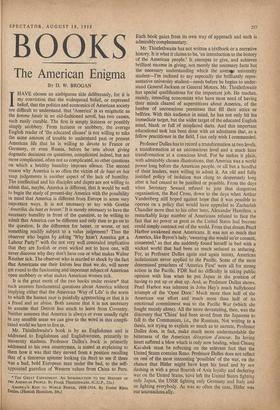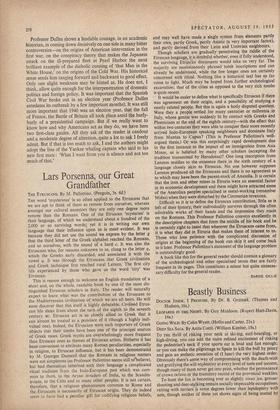BOOK
The American Enigma
BY D. W. BROGAN IHAVE chosen an ambiguous title deliberately, for it is my conviction that the widespread belief, or expressed belief, that the politics and economics of American society are difficult to understand, that 'America' is as enigmatic as the femme fatale in an old-fashioned novel, has two causes, each easily curable. The first is simply laziness or possibly simply snobbery. From laziness or snobbery, the average English reader of 'the educated classes' is not willing to take the same amount of trouble to understand past or present American life that he is willing to devote to France or Germany, or even Russia, before he sets about giving dogmatic decisions on questions, complicated indeed, but not more complicated, often not as complicated, as other questions on which a healthy humility imposes silence. The second reason why America is so often the victim of de haut en bas snap judgements is another aspect of the lack of humility. The intellectual and his disciples and dupes are not willing to admit that, maybe, America is different, that it would be well to begin the study of present-day America with the possibility in mind that America is different from Europe in some very important ways. It is not necessary to say with Goethe 'Amerika, du bast es besser.' It is merely necessary to have the necessary humility in front of the question, to be willing to admit that America can be different and only then to go on to the question, Is the difference for better, or worse, or not something readily subject to a value judgement? Thus the observer who begins by asking 'Why hasn't America got a Labour Party?' with the not very well concealed implication that they are foolish or even wicked not to have one, will never discover why they don't have one or what makes Walter Reuther tick. The observer who is startled to shock by the fact that Americans use their knives less than we ,do, will never get round to the fascinating and important subject of American open snobbery or what makes American women tick.
It is the great merit of the two books under review* that each answers fundamental questions about America without implying either that the American 'Way of Life' is the norm to which the human race is painfully approaching or that it is a fraud and an abuse. Both assume that it is not necessary to assume that Detroit has much to learn from Coventry. Neither assumes that America is always or even usually right in any sensible sense we can give to the word in this compli- cated world we have to live in.
Mr. Thistlethwaite's book is by an Englishman and is addressed to Englishmen and Englishwomen, primarily to university students. Professor Dulles's book is primarily addressed to his own countrymen, is aimed at explaining to them how it was that they moved from a position recalling that of a timorous spinster looking (in fear) to see if there Was a bad, bold European man under the bed, to the self- appointed guardian of Western values from China to Peru.
* THE GREAT EXPERIMENT. AN INTRODUCTION TO THE HISTORY OP THE AMERICAN PEOPLE. By Frank Thistlethwaite. (C.U.P., 25s.) AMERICA'S RISE 70 WORLD POWER, 1898-1954. By Foster Rhea Dulles. (Hamish Hamilton, 30s.) Each book gains from its own way of approach and each is admirably complementary.
Mr. Thistlethwaite has not written a textbook or a narrative history. It is what it claims to be, 'an introduction to the history of the American people.' It, attempts to give, and achieves brilliant success in giving, not merely the necessary facts but the necessary understanding which the averow university student—I'm inclined to say especially the brilliantly repre- sentative university student—needs before he begins to under- stand General Jackson or General Motors. Mr. Thistlethwaite has special qualifications for the important job. He teaches. mainly, intending economists who have most need of having their minds cleared of superstitions about America. of the lumber of unconscious premisses that fill their attics or belfries. With this audience in mind, he has not only hit his immediate target, but the wider target of the educated English mind, blank or full of misplaced darts. And this important educational task has been done with an adroitness that, as a fellow practitioner in the field, I can only wish 1 commanded.
Professor Dulles has to record a transformation at two levels. a transformation at an unconscious level and a much later transformation at a conscious level. For he makes it plain. with admirably chosen illustrations, that America was a world power long before the American people, or all but a handful of their leaders, were willing to admit it. An old and fully justified policy of isolation was clung to desperately long after it had ceased to be justified or possible. From the days when Secretary Seward refused to join that dangerous organisation, the Red Cross, down to the days when Arthur Vandenberg still hoped against hope that it was possible to operate on a policy that would have appealed to Zachariah Chandler more than to his other hero, Alexander Hamilton, a remarkably large number of Americans refused to face the fact that no power as great as the United States had become could simply contract out of the world. From that dream Pearl Harbor awakened most Americans. It was not so much that America, like Byron's lady, 'swearing she would ne'er consent, consented,' as that she suddenly found herself in bed with a wicked world that had been as much seduced as seducing. For, as Professor Dulles again and again insists, American isolationism never applied to the Pacific. Some of the most determined preachers of 'America First' were all for strong action in the Pacific. FDR had no difficulty in taking public opinion with him when he put Japan in the position of having to put up or shut up. And, as Professor Dulles shows, Pearl Harbor was inherent in John Hay's much ballyhooed triumph of the 'Open Door.' Much more than half of the American war effort and much more than half of its emotional commitment was to the Pacific War (which she fought mainly alone). All the more devastating, then, was the discovery that 'China' had been saved from the Japanese to fall to the Communists, i.e., the Russians. Not writing to a thesis, not trying to explain so much as to narrate, Professor Dulles does, in fact, make much more understandable the bitterness of the American deception clamour. Its loving heart suffered a blow which is only now healing, when Chiang Kai-shek must be reflecting on the -relevant fact that the United States contains Reno. Professor Dulles does not reflect on one of the most interesting 'possibles' of the war, on the chance that Hitler might have kept his head and by not dashing in with a great flourish of Axis loyalty and declaring war on the United States, have left the United States fighting only Japan, the USSR fighting only Germany and Italy and us fighting everybody. As was so often the case, Hitler was our unconscious ally. Professor Dulles shows a laudable courage, in an academic historian, in coming down decisively on one side in many bitter controversies—on the origins of American intervention in the first war, on the conspiracy theory that makes the Japanese attack on the ill-prepared fleet at Pearl Harbor the most brilliant example of the diabolic cunning of 'that Man in the White House,' on the origins of the Cold War. His historical sense sends him ranging forward and backward to good effect. Only one slight weakness may be hinted at. He does not, I think, allow quite enough for the interpenetration of domestic politics and foreign policy. It was important that the Spanish Civil War broke out in an election year (Professor Dulles antedates its outbreak by a few important months). It was still more important that 1940 was an election year, that the fall of France, the Battle of Britain all took place amid the hurly- burly of a presidential campaign. But if we really want to know how and why Americans act as they do, we have here two first-class guides. All they ask of the reader is candour and a moderate degree of attention, quite a lot to ask I freely admit. But if that is too much to ask, I and the authors might adopt the line of the Yankee whaling captain who said to his new first mate : 'What I want from you is silence and not too much of that.'



































 Previous page
Previous page